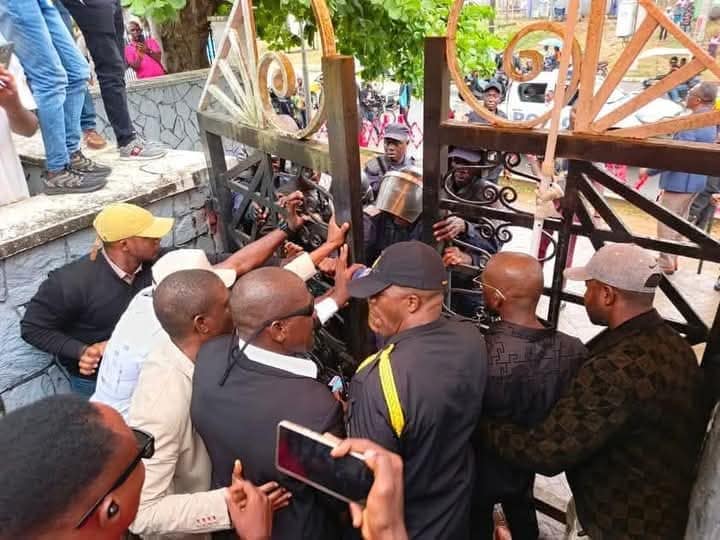The political landscape of Liberia witnessed a tumultuous turn of events following a Supreme Court ruling that reaffirmed the legitimacy of Speaker J. Fonati Koffa’s leadership in the 54th Legislature. This decision, while intended to settle the ongoing dispute over the Speakership, instead ignited a fresh wave of tension and division within the House of Representatives. Supporters of Speaker Koffa, including Representative Yekeh Kolubah, stormed the Capitol Building, vandalizing property and issuing defiant pronouncements. Their actions, including the dramatic tearing down of a portrait of Representative Richard Nagbe Koon, who had styled himself as the “Regime Speaker,” underscored the deep-seated animosity and lack of unity within the legislative body.
The incident involving the portrait of Representative Koon became a symbolic representation of the power struggle within the House. Representative Kolubah’s justification for his actions – that Koon was not the legitimate Speaker and therefore his portrait should not be displayed – highlighted the underlying dispute over authority and recognition. This act of vandalism, captured on video, served as a stark visual reminder of the fragility of political decorum and the potential for escalation in the face of unresolved conflict. The destruction of the portrait further fueled the existing tensions and underscored the challenges facing any attempts at reconciliation.
Speaker Koffa, in the immediate aftermath of the Supreme Court ruling, had publicly called for reconciliation and a transition towards healing the divisions within the House. He expressed his willingness to make sacrifices for the greater good of the legislative body and the nation, emphasizing the importance of demonstrating democratic principles in resolving their differences. However, the actions of his supporters, specifically the vandalism at the Capitol Building, directly contradicted his calls for unity and peaceful resolution. This discrepancy between Koffa’s words and the actions of his allies created a sense of dissonance and raised questions about his ability to control his own camp and effectively lead the reconciliation process.
The incident at the Capitol Building also involved Representative Malvin Cole, who addressed workers and instructed departmental heads not to take instructions from any member of the majority bloc. This directive further exacerbated the existing divisions and added another layer of complexity to the already tense political climate. By instructing staff to disregard directives from certain members, Representative Cole essentially undermined the authority of those members and contributed to the atmosphere of defiance and disregard for established procedures. This act of insubordination underscored the deep-seated factionalism and power struggles within the House.
The vandalism and pronouncements at the Capitol Building following the Supreme Court ruling cast a long shadow over Speaker Koffa’s calls for reconciliation. His supporters’ actions, directly contradicting his message of unity, created a significant obstacle to any meaningful progress towards healing the divisions within the House. The incident served as a stark reminder of the deep-seated animosity and lack of trust between the opposing factions. The challenge facing Speaker Koffa was to bridge this divide and effectively lead the reconciliation process despite the actions of his own supporters.
The path towards reconciliation within the Liberian House of Representatives appeared fraught with challenges following the events at the Capitol Building. The vandalism and defiant pronouncements underscored the deep divisions and lack of unity within the legislative body. Speaker Koffa’s calls for reconciliation, while well-intentioned, faced an uphill battle in the face of these actions. The incident served as a stark reminder of the fragility of political processes and the importance of upholding democratic principles in resolving conflict. The future of the House hinged on the ability of its members to overcome their differences and work together for the benefit of the nation. The incident highlighted the vital need for dialogue, compromise, and a commitment to restoring order and functionality within the legislative body. The acts of vandalism, while seemingly isolated, represented a larger struggle for power and control, which needed to be addressed to achieve genuine reconciliation and progress. The challenge for Speaker Koffa and the entire House was to move beyond these destructive acts and engage in constructive dialogue to resolve their differences and rebuild trust.


